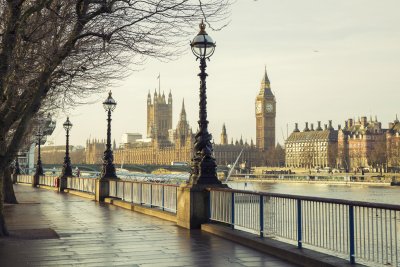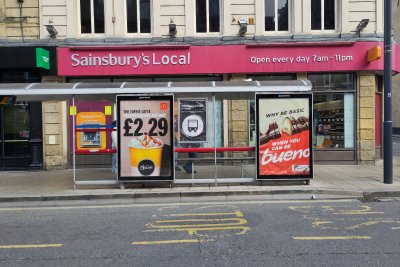This week has been another turbulent one in Westminster. Prime Minister Theresa May is in Brussels today to ask for an extension to Article 50 but for now, in law, March 29 remains the date we leave the EU, with or without a deal.
Our campaign to ensure vulnerable people don’t go hungry in the event of a no deal Brexit continues apace, amid signs that government is taking notice. Last week, DWP Secretary of State Amber Rudd confirmed the government is considering a food hardship fund.
Sustain Patron Baroness Rosie Boycott asked a series of questions in parliament on our behalf. You’ll find the response to our question about public sector catering and a no deal Brexit in full here but Defra Minister Lord Gardiner of Kimble stated that government departments were “confident that the supply of quality, nutritious meals in public sector settings will be maintained, in all scenarios”. Having spoken to a number of public sector caterers and their suppliers, we don’t share his confidence.
Furthermore, the response was inadequate to our question about preparedness to support food banks and frontline charities serving the most vulnerable people. We continue to press Government for answers on this which is why, with thanks to all of you who have already signed and shared our #NoDealNoMeal action, we ask you to continue to share it, put it in newsletters and share on social media.
This week, Sustain and colleagues attended a stakeholder meeting with Defra Secretary of State Michael Gove on trade policy. We renewed our trade red lines at the meeting, which was useful but not conclusive. We suspect it was called in response to: huge public pressure not to lower food standards via trade deals; widespread controversy about US meat hygiene and animal welfare standards; and the trade amendments lots of us are seeking to the Agriculture Bill. It's important that the voices of concerned citizens continue to be heard.
Kath Dalmeny
Chief Executive, Sustain: the alliance for better food and farming
www.sustainweb.org
@UKSustain
Food and Farming (Agriculture Bill)
The Agriculture Bill's progress is still stalled. The new Farm Minister Robert Goodwill MP, replacing George Eustice MP, and with responsibility for the Bill’s progress, spoke at a recent debate on farming and the environment talking of the need for new entrant farmers, the need for multi-annual settlement for farm payments, and how the delivery of environmental objectives are not mutually exclusive. We hope to meet with him soon to discuss the amendments we are supporting and why. Whilst the Bill is quiet, we have been writing some articles to explore post-Brexit policy including on food prices and tariffs for Riverford magazine, on trade in food for the RSA Food, Farming and Countryside Commission and in the Farmers' Guardian on new Environmental Land Management Scheme developments (ELMS). The Greener UK coalition have finalised their Report Stage briefing on the Agriculture Bill and ours are all accessible here. (Vicki Hird)
UK needs to follow EU lead and stop unfair trading practices
A new EU directive will support farmers getting a fairer deal in their trading relationships. Sustain says the UK needs to introduce equivalent legal measures in the Agriculture Bill.
New report shows how agro-ecology farming and diets can feed the world
A new report launched by the Soil Association shows how an organically farmed Europe can feed a growing population a healthy diet.
Where bleached chickens meet the silence of the lambs
Vicki Hird has blogged for the RSA’s Food, Farming and Countryside Commission on the implications for food and farming of recent trade announcements.
Farming Unions write to the Chancellor about the government's post Brexit tariff plan
The UK farming unions have written to the Chancellor warning that the recent UK applied tariff policy announcement is another example of how British farming will be damaged by a no-deal Brexit.
Fish (Fisheries Bill)
This feels like a copy-and-paste of the farming news, but the Fisheries Bill is also stalled and, although a number of amendments to the Bill have now been tabled for consideration, there is no news about when the Bill will progress to the next stage.
Melanie Onn, MP for Great Grimsby, held a Westminster Hall Debate about fishing on March 13th (listen here). The debate mainly focused on trade, the need for migrant labour and infrastructure, there was some talk about sustainability and the future of our marine resources. Sustain sent a briefing to 50 MPs in advance of the debate to encourage their attendance and provide some information about why sustainable fishing makes good business sense. (Ruth Westcott)
This is why British fishers will do worse out of Brexit than British farmers
Despite warm promises that the fishing industry will do well out of Brexit, Government plans for how much boats will be able to catch, and how they will be supported to rebuild depleted fish stocks have still not been confirmed, says Sustain's Sustainable Fish campaign lead Ruth Westcott.
International Trade (Trade Bill)
The Trade Bill passed its third reading in the Lords and will move on to the Commons. A government amendment appeared to include safeguards for animal, human and environmental health but left out other important areas like food standards, product labelling and issues that are not yet covered by UK law, such as control of farm antibiotic use to prevent antimicrobial resistance. We are support amendments added by the Lords, making it an ‘objective’ of the government to pursue a trade deal with the EU and for parliamentary approval of future trade agreements.
The government’s announcement that it in the event of a no deal Brexit, the UK would set import tariffs at zero for some agricultural products has caused considerable consternation: Compassion in World Farming have pointed out that this could pave the way for the return of battery eggs to our plates. (Orla Delargy)
Government plans import tariffs on meat, butter, fish and fertiliser in the event of a no deal Brexit
The Government published details of the tariffs it intends to put on imports in order to protect some UK industry in the event of a no deal Brexit. This was, it said, to help inform MPs deciding how to vote on the Withdrawal Agreement, and whether the UK should exit the EU on Friday 29 March without a deal.
Sustain responds with dismay to US Ambassador claim that US food poisoning is lower than in the UK
The US Ambassador to the UK Woody Johnson was interviewed by the BBC Radio 4 Today programme (6 March, 07.30am). He said that the UK needed to include food and agriculture in future trade deals with the US, and claimed US food poisoning rates are lower than in the UK. Sustain responds.
Environment
Greener UK releases new Brexit risk tracker
Greener UK analysis shows there is now a ‘high risk’ of weaker environmental protections, in relation to nature and biodiversity, chemical regulation and several other important areas after Brexit.
Other recent Brexit-related news
Make Brexit a better deal for animals
Sustain member Wildlife and Countryside Link have brought together 36 animal protection groups calling for animals to be protected after Brexit.
Brexit: We stand at a cross-roads. When the UK leaves the European Union, will our leaders uphold good standards for our food, farming, fishing and trade deals? And will they agree a sensible deal with the EU? We need to make sure that they do!



